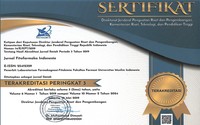The Effect of Qur'an Reading in Jewawut Infusion (Setaria italica) on Changes in Cholesterol Levels: A Study in Vivo
Abstract
Keywords
Full Text:
PDFReferences
Anitha, S., Tsusaka, T., Botha, R., Potaka, J., Givens, D., Rajendran, A., & Bandhari, R. (2022). Are Millets More Effective in Managing Hyperlipidaemia and Obesity than Major Cereal Staples? A Systematic Review and Meta-Analysis. Sustainability, Vol : 14; pp : 1 - 4.
Anusha, B., Hymavathi, T., Vijayalakshmi, V., Reddy, P., & Robert, P. (2018). Lipid-lowering Effects of Foxtail Millet (Setariaitalica) and Quinoa (Chenopodium quinoawild) in Pre-diabetics. Journal of Pharmaceutical Research International, Vol: 24; Issue : 5; pp : 1-7.
Mapanawang, A. (2017). Effect Of Boteme Consumption (Setaria Italica) to Decrease Of Cholesterol Condition in Hypercolesterol Patients. International Journal of Health Medicine and Current Research, Vol. 2; Issue 02; pp.397-407.
Radin, D., Lund, N., Emoto, M., & Kizu, T. (2008). Effects of Distant Intention on Water Crystal Formation: A Triple-Blind Replication. Journal of Scientific Exploration, Vol. 22; No. 4; pp. 481–493.
Sayska, D., & Arni, J. (2016). Evidences of Scientific Miracle of Al-Qur'an in the Modern Area. Jurnal Ushuluddin, Vol. 24; No. 1; pp : 79-90.
Sireesha, Y., Kasetti, R., Nabi, S., Swapna, S., & Apparao, C. (2011). Antihyperglycemic and Hypolipidemic activities of Setaria italica Seeds in STZ Diabetic Rats. Patophysiology, Vol : 18; Issue : 2; pp 159-164.
Sofi, F., & Dinu, M. (2016). Nutrition and Prevention of Chronic-Degenerative Diseases. Agriculture and Agricultural Science Procedia, Vol : 8; pp : 713-717.
Soran H, A. S., S, K., T, S., Y, L., AA, S., SS, D., . . . PN., D. (2018). Hypercholesterolaemia - Practical Information for Non-Specialists. Arch Med Sci, Vo : 14; Issue : 1; pp : 1-21.
Thathola, A., Srivastava, S., & Singh, G. (2011). Effect of Foxtail Millet (Setaria Italica) Supplementation on Serum Glucose, Serum Lipids and Glycosylated Haemoglobin in Type 2 Diabetics. Diabetol. Croatica, Vol : 40; pp : 23 - 29.
DOI: https://doi.org/10.33096/jffi.v9i3.923
Copyright (c) 2022 Haniah Haniah

This work is licensed under a Creative Commons Attribution-ShareAlike 4.0 International License.
Indexed by:
ISSN: 2356-0398 | e-ISSN: 2541-2329
Editor's Address:
Third Floor Pharmacognosy-phytochemistry laboratory building, Urip Sumoharjo road km. 5 Campus II UMI, Makassar, South Sulawesi, Indonesia
Phone: +6281524045514
Fax: +62411425619
E-mail: editorjfi@umi.ac.id

















.jpg)

